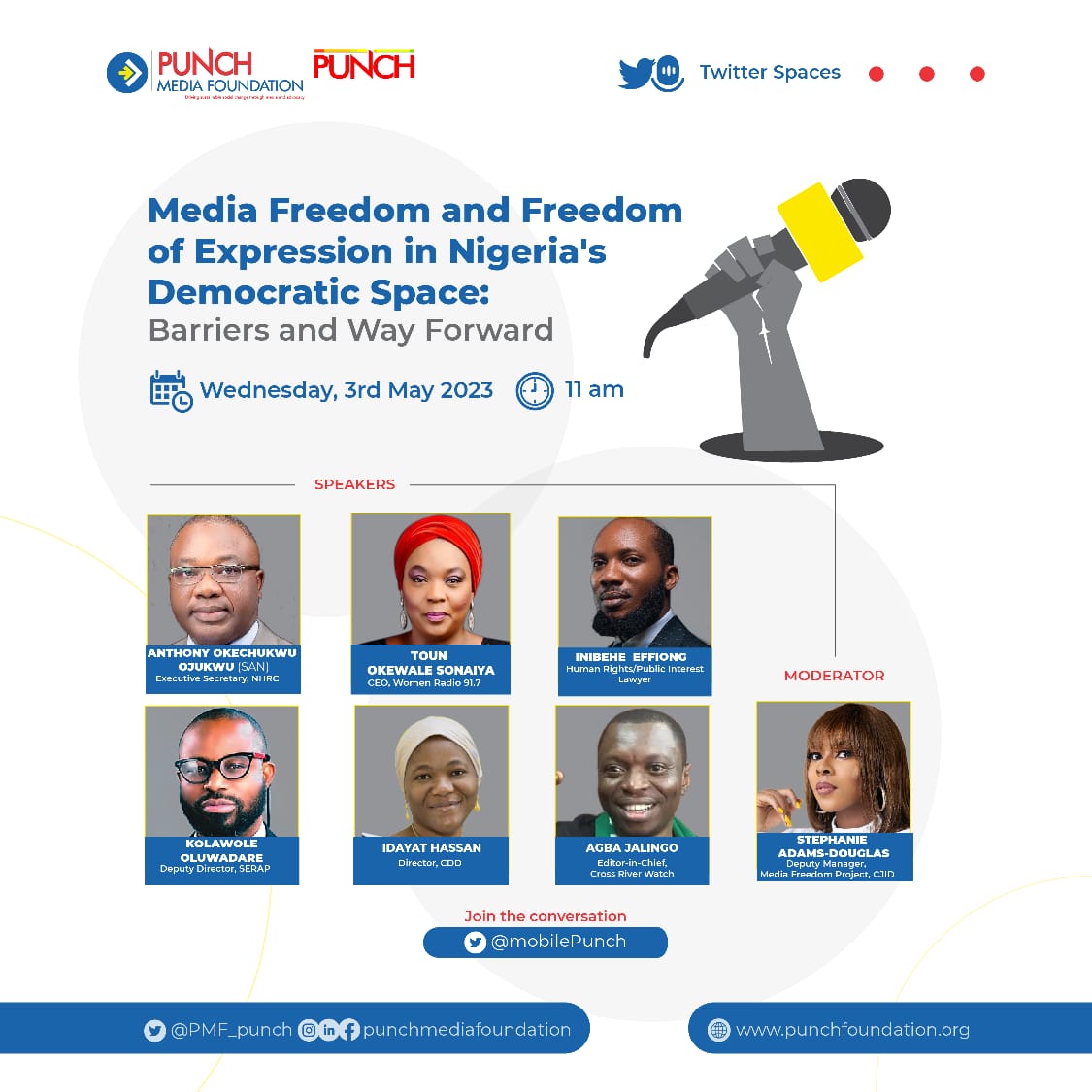
They, however, argued that the challenges had always been the political will to enforce the available laws in guaranteeing freedom of expression as backed by the Constitution.
The experts made the submission while speaking during the PUNCH Media Foundation event to commemorate World Freedom Day 2023.
First marked on May 3, 1993, World Press Freedom Day seeks to address issues surrounding freedom of the press by state and non-state actors. The WPF Day is celebrated every year to promote and defend the principles of press freedom.
The PUNCH Media Foundation event has ‘Media Freedom and Freedom of Expression in Nigeria’s Democratic Speace: Barriers and Way Forward’ as its theme.
Speakers at the virtual event are the Executive Secretary of the National Human Rights Commission, Anthony Okechukwu Ojukwu, and the Chief Executive Officer of Women Radio 91.7, Toun Okewale Sonaiya.
Other speakers include the Deputy Director of Socio-Economic Rights and Accountability Project, Kolawole Oluwadare; Editor-in-Chief, Cross River Watch, Agba Jalingo; the Director, Centre for Democracy and Development, Idayat Hassan; and human rights lawyer, Inibehe Effiong.
While dissecting the impediment to media freedom and freedom of expression, discussants at the event including journalists, activists, policymakers, human rights defenders maintained that journalists and media practitioners must begin to hold relevant stakeholders accountable to guarantee media independence.
While speaking, the Chief Executive Officer of Women Radio 91.7, Toun Sonaiya, decried the alleged gagging of the media in the country, adding that it was important journalists speak truth to power an demand media freedom.
Sonaiya, who analysed several hazards journalists encountered in their line of duties, including professionals who have paid the supreme price, said journalists must do their job well and hold governments accountable.
She said, “The media is highly gagged in Nigeria and we must not keep quiet. How do we make progress if the media is being attacked?
Sonaiya, however, urged journalists and media stakeholders to do their work diligently and be thorough professionals. In doing this, she argued, journalists will be respected and supported.
“When people see that you do your job, you will be respected and supported,” she added.
On his part, the Editor-in-Chief, Cross River Watch, Agba Jalingo, urged journalists to bond together in rejecting those bent on trampling on press freedom and freedom of expression in Nigeria’s democratic space.
He urged journalists and media professionals to exploit their ink in demanding what is right and ensure it is seen being done.
“We (journalists) have our biros, the only other thing is to bond together. Society does not back us up. We need to bond together. We have opened our flanks and allowed them to come after us.
“The best way to protect ourselves is by bonding and we must defend ourselves.
“We must use every drain of the ink we have in our pen and strive to ensure that Nigeria does not criminalise the freedom of speech and press freedom,” Jalingo said.
He also makes a case for the safety of journalists adding that media owners and stakeholders must take their employees’ welfare seriously.
Also speaking, the SERAP Deputy Director, Kolawole Oluwadare, urged journalists and rights defenders to continue to demand the implementation of relevant laws protecting press freedom and freedom of expression.
According to him, we need to be careful in demanding new legislation to avoid suppressive laws and legislation.
“What we need is continuous advocacy to let people know what their rights are and to continue to demand their rights,” the SERAP boss said.
On his part, the NHRC Executive Secretary, who was represented by the Director, Media and Communication, Agharese Arase, assured media professionals that the commission was ready to support freedom of expression and press freedom.
He, however, said while Nigerian journalists and media professionals have been holding the government accountable, they must intensify the demand for entrenching press freedom and freedom of expression in Nigeria’s democratic space.
“The media is already playing the tune but must increase the volume,” Ojukwu said.





